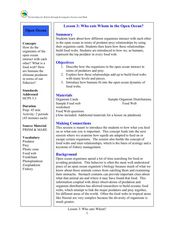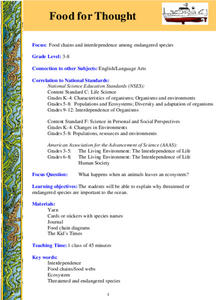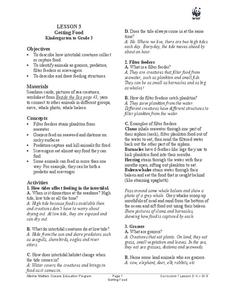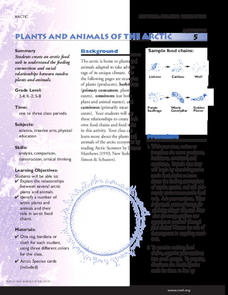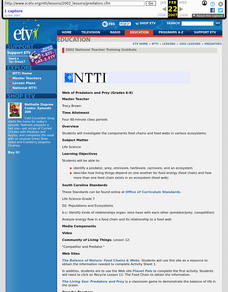Curated OER
Who Eats Whom in the Open Ocean?
Learners examine how organisms interact with one another in the ocean. In this science lesson plan, students discuss predators and prey in the ocean. Learners discuss food webs and how organisms interact with each other.
Curated OER
9th Grade
Ninth graders discuss the principal source of energy entering the marine ecosystem. They name some of the autotrophs at the Maui Ocean Center. Students name some of the heterotrophs at Maui Ocean Center. They are taught that plants are...
NOAA
Animals of the Fire Ice
When the sun's rays can't reach the producers in a food web, where does all the energy come from? Extreme environments call for extreme food sources. Young scientists investigate creatures that appear to get their energy from methane...
NOAA
Through Robot Eyes
How do robots assist ocean explorers in collecting data and images? The final installment in a five-part series has science scholars examine underwater images collected by robots and identify the organisms shown. Groups then calculate...
Curated OER
Food for Thought
Students explore the food chains in a variety of ecosystems and its relationship to the survival of threatened or endangered marine animals or fish in the ocean. The interdependence of the species is investigated in this lesson.
NOAA
Deep-Sea Ecosystems – Life is Weird!
A pool of brine in the deep sea can be up to four times as salty as the surrounding sea water. The deep sea ecosystem relies on chemosynthesis and the organisms that live there are often strange to us. The lesson focuses on researching...
Curated OER
Getting Food
Learners complete activities to learn about the ocean food web. In this ocean life lesson plan, students discuss how the tides affect feeding, learn about filter feeders, grazers, predators, and scavengers. Learners then group the...
Curated OER
Introduction to Ocean Grazers
Students explore biology by creating a poster with classmates. In this oceanography lesson, students identify the importance of coral reefs to the ocean's ecology and examine a food web of ocean animals. Students define a list of...
Curated OER
Fish Are Animals Too
Students create posters that show how a shark is a major predator in kelp forests and coral reefs after studying the food webs for these ecosystems. They determine that fish are important animals in the ocean's web of life.
Curated OER
Chewin' in the Chesapeake
Students examine a web page on food webs and select a habitat to research. In this research activity students identify the organisms found in the food web and present their findings to the class.
Curated OER
Water is Life
Krill is a very small ocean animal that is key to keeping the ocean ecosystem going. The class reviews food webs and chains, learns about the importance of krill, discusses krill anatomy, builds a model of a krill, and then has a...
University of California
Energy and Biomass Pyramids
Young scientists play tag as they act out the food pyramid in the ocean ecosystem. Energy circles pass from the smaller prey to the predators and at the end of the activity, a data chart and analysis questions allow pupils to apply their...
National Wildlife Federation
Plants and Animals of the Arctic
The Arctic food web may be more limited than other environments, but it has all the same components. With an interactive activity, pupils assume the roles of the components of an Arctic food chain. They move around and link themselves to...
Curated OER
Jelly Critters
Students compare and contrast three different organisms that are considered gelatinous zooplankton. They describe how they fit into marine food webs.
Curated OER
Web of Predators and Prey
Middle schoolers investigate the components food chains and food webs in various ecosystems. They describe how living things depend on one another for food energy (food chain) and how more than one food chain exists in an ecosystem
Forest Foundation
The Web of Life
Producers, herbivores, carnivores, omnivores, decomposers. To begin a study of the forest ecosystem, learners examine the connections among the members of ecological communities.
Curated OER
A House for Me- Ocean Environments
Students explore ocean environments. In this ocean environment lesson, students identify the things ocean animals need for survival. Students use KWL charts and search the Internet collecting information about ocean habitats....
Curated OER
Food for Thought
Learners understand the importance of each member of a food chain through a game. In this food chains lesson, students receive background information and then play a game to simulate what happens in the food chain of an endangered...
Curated OER
Marine Ecosystems
Students identify producers and consumers and construct a food chain from four marine ecosystems. They describe the delicate balance among organisms in each environment. In groups, students discuss the human activities that upset the...
Curated OER
Along Our Coast
Students explore the coast lines of Florida. They examine the benefits of estuaries and examine the estuary systems found along the coast. Students research and construct a saltwater food web.
Curated OER
Bering Sea Buffet - A Foodweb Activity
Life in the Bering Sea, food webs, and the ocean ecosystem are introduced with a map activity. The lesson plan starts as kids explore maps and images of the Bering Sea, then it kicks into high gear as they start to discuss the types of...
Curated OER
Lesson 9 - Along Our Coast
Students study the benefits of estuaries. They construct a saltwater food web, and complete worksheets and a quiz.
Curated OER
Where's Dinner?
Upcoming marine biologists consider a list of organisms residing near the Lost City hydrothermal vents and construct a food web. They compare the food web to that of a cold seep community, of which they should have previous knowledge....
Polar Trec
Plankton Parents
Plankton are so abundant in the ocean they outweigh all of the animals in the sea. In this three day activity, groups discuss and become familiar with plankton, capture females, and look for egg production on day three.
